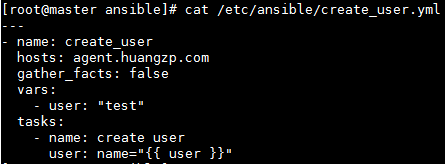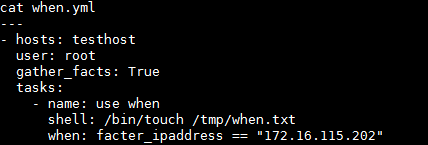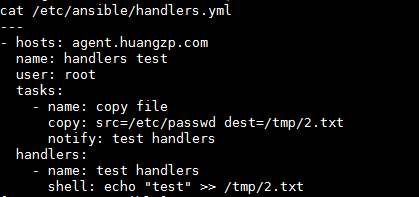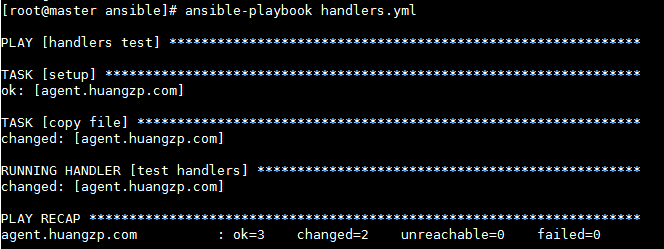Ansible特点
基于python语言开发
不需要安装客户端,通过sshd通信
基于模块工作,模块支持多种语言开发
支持编写yaml格式的playbook,配置文件缩进2行
支持sudo
提供UI,流量器图形化 www.ansible.com/tower
开源UI https://gitub.com/alaxli/ansible_ui
一、Ansible安装配置
1. 环境
master:172.16.115.157
agent:172.16.115.202
2. 服务端安装ansible,客户端无需安装,关闭selinux
setenforce 0
yum install -y epel-release
yum install -y ansible
yum install -y openssl-clients
3. 服务端生成密钥对,目录/root/.ssh/
ssh-keygen -t rsa //无需设置单独密码,生成公钥和秘钥id_rsa id_rsa.pub
4. 将服务端公钥内容放到客户机和本机认证文件中,授600权限
scp /root/.ssh/id-rsa.pub ip:/root/.ssh/authorized_keys
cat /root/.ssh/id-rsa.pub >>/root/.ssh/authorized_keys // ssh 127.0.0.1
chmod 600 /root/.ssh/authorized_keys
5. 修改ansible配置文件/etc/ansible/hosts,添加组以及组内IP
[testhost] #自定义主机组名字
172.16.115.157 #组内机器ip或者机器域名(需先配置好/etc/hosts)
127.0.0.1
二、命令模块使用
1. Ansible文档使用
ansible-doc -l # 列出所有模块
ansible-doc cron # 查看指定模块文档
2. ping命令模块
ansible testhost -m ping #测试机器是否在线
3. command命令模块
ansible testhost -m command -a 'w' #批量执行命令;-m 后面跟模块名;-a 跟命令
ansible 172.16.115.202 -m command -a 'w' #单独执行命令
4. shell命令模块
说明:shell包含command,并且支持管道和远程执行脚本
ansible testhost -m -a 'w'
注:可能用到的扩展包:yum install -y libselinux-python
5. copy命令模块-拷贝目录和文件
说明:可同时指定用户属主和权限,源目录拷贝到目标目录下面去,如果目标目录不存在,则会自动创建
ansible master.huangzp.com -m copy -a "src=/etc/ansible dest=/tmp/ansibletest owner=root group=root mode=0755"
ansible master.huangzp.com -m copy -a "src=/etc/passwd dest=/tmp/1.txt"
6. cron命令模块-添加和删除计任务
说明:name计划名称,job计划动作
ansible testhost -m -a "name='test_cron' job='/bin/touch /tmp/ansible_test02.txt day='1-30' weekday='4'"
ansible testhost -m cron -a "name='test_cron' state='absent'"
注:分钟minute 小时hour 日期day 月份month 周weekday
7. yum命令模块-安装rpm包
说明:rpm需写全称(实际,远程执行shell命令更方便),可以填写state=installed
ansible testhost -m yum -a "name=iftop"
注:双引号中没有单引号
8. service命令模块-管理rpm服务
说明:state状态可以为:启动start、停止stop等;enabled为开机启动
ansible testhost -m service -a "name=iftop state=started enabled=yes"
三、ansible playbook
相当于将各命令模块内容写进配置文件中,然后集中执行,类似于shell脚本。例如:实际生产中,需批量管理很多机器,yum安装,管理配置文件、服务等
1. ansible配置文件格式
vim /etc/ansible/test.yml # 以.yml结尾
--- #固定格式开头 - hosts: testhost #目标主机列表,可以是单台主机 remote_user: root #指定用什么用户登录远程主机执行操作 tasks: - name: test_playbook #任务描述,会打印出来 shell: /bin/touch /tmp/ansible_test03.txt #具体任务
2. 执行ansible playbook
ansible-playbook test.yml
3. 搜集机器上系统相关信息,用到setup模块
说明:当管理较多不同系统的主机时,可以根据获取到的不同类型执行对应操作,如Ubuntu,使用apt-get
ansible testhost -m setup
4. ansible变量-user命令模块
vim /etc/ansible/create_user.yml
---
- name: create_user
hosts: agent.huangzp.com
gather_facts: false #是否启用setup命令模块获取的信息
vars:
- user: "test" #var指定user为变量,test为变量的值,需引号
tasks:
- name: create user
user: name="{{ user }}" #name为user命令模块的参数,{{ user }}变量表示形式
5. file命令模块-ansible循环
vim /etc/ansible/loop.yml
---
- hosts: testhost
user: root
tasks:
- name: change mode for file
file: path=/tmp/{{ item }} mode=600 owner=root group=root
with_items:
- 1.txt
- 2.txt
6. when命令模块-ansible条件判断
vim /etc/ansible/when.yml
--- - hosts: testhost user: root gather_facts: True tasks: - name: use when shell: /bin/touch /tmp/when.txt when: facter_ipaddress == "172.16.115.202"
7. handlers命令模块-条件判断
vim /etc/ansible/handlers.yml
说明:只有copy模块执行后,再执行Handlers,与的关系。如果客户机上已经有一个2.txt文件,且内容和服务机上的passwd一致,判断之后,这一步不执行,从而也不会调用test handlers;非常适合同步配置文件,比如:如果配置文件更改了就重启服务,如果没有更改就不重启
--- - hosts: agent.huangzp.com name: handlers test user: root tasks: - name: copy file copy: src=/etc/passwd dest=/tmp/2.txt notify: test handlers handlers: - name: test handlers shell: echo "test" >> /tmp/2.txt
注:编辑agent.huangzp.com上/tmp/2.txt去掉test后,master上再次执行ansible-playbook handlers.yml 则不会再执行echo “test” >> /tmp/2.txt










